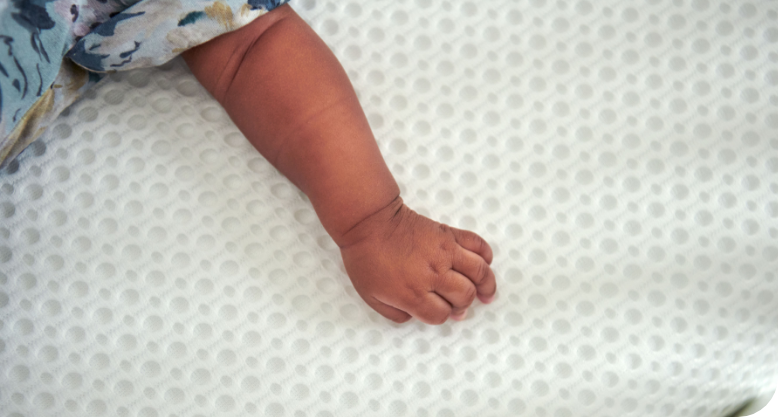Poor Sleep Affects Baby's Eating Habits and Digestion

By Jenni June Certified Child and Family Sleep Consultant, CLC and mom of 4!
Did you know the best way to help improve your baby?s eating and nursing habits beyond the age of four months old is to improve the quality and quantity of their sleep? ?
Many parents, and even well meaning pediatricians, don?t realize that when sleep continues to be fragmented for multiple middle-of-the-night feedings (beyond the point that a healthy, baby?s nighttime circadian rhythm fully develops), sleep deprivation sets in very quickly. Fragmented sleep creates sleep deprivation just as much as prolonged wakefulness does.
When humans, even little humans, are chronically deprived of sleep, it elevates stress levels to chronic states. This often triggers the stress response system to operate in fight-or-flight mode for prolonged periods of time, beyond what is healthy and normal, throwing homeostasis off kilter. We know the result of this for older children and adults is typically obesity, diabetes, irritable bowel syndrome, inflammatory bowel disease, gastro-esophageal reflux, liver disorders and even colorectal cancer, according to a study published in World Journal of Gastroenterology (2013). [1]
 After carefully evaluating the thousands of infant sleep training cases I have worked on over the years, I began to notice a very clear common thread and pattern with babies age four months to twenty-four months old. Children of this age, who are chronically sleep deprived tend to engage in lighter, more snack-like feedings at the breast or bottle, and it seems they experience increased, more dramatic spitting-up. It also appears that they tend to struggle with acid reflux beyond age four months, along with excess gas, upset tummy, constipation, diarrhea, resistance of solid foods beyond age seven months, and are often underweight. However, after about day four or five into the sleep training process, using my 4 Pillars of Sleep HygieneTM (in combination with a properly matched behavioral sleep training method, if needed), parents were reporting that the severity of all of these issues were alleviated dramatically! Their once picky, light and snacky eater that they had to practically chase around with bites of food, or force feed and feed around the clock, because they were so underweight, began taking heartier more focused feeds at the breast, bottle, and during solid food feedings during the day. And, get this! They were able to digest these larger intakes of milk or food a lot better. This, in turn, helped parents to press on with the struggle of jumping out of their part in the vicious cycle they were previously caught up in with compensating for the poor daytime eating and nursing habits (i.e. continuing to fragment their child?s sleep with the ?all-night open bar? throughout the night to get them to consume more calories in a 24 hour period). Parents began to trust in the natural process of allowing the power of the sleep hygiene to consolidate sleep at night, since it was clearly helping to consolidate calories during the day and improving their child?s overall nutrition, eating, and digestion habits, without any effort at all. ?
After carefully evaluating the thousands of infant sleep training cases I have worked on over the years, I began to notice a very clear common thread and pattern with babies age four months to twenty-four months old. Children of this age, who are chronically sleep deprived tend to engage in lighter, more snack-like feedings at the breast or bottle, and it seems they experience increased, more dramatic spitting-up. It also appears that they tend to struggle with acid reflux beyond age four months, along with excess gas, upset tummy, constipation, diarrhea, resistance of solid foods beyond age seven months, and are often underweight. However, after about day four or five into the sleep training process, using my 4 Pillars of Sleep HygieneTM (in combination with a properly matched behavioral sleep training method, if needed), parents were reporting that the severity of all of these issues were alleviated dramatically! Their once picky, light and snacky eater that they had to practically chase around with bites of food, or force feed and feed around the clock, because they were so underweight, began taking heartier more focused feeds at the breast, bottle, and during solid food feedings during the day. And, get this! They were able to digest these larger intakes of milk or food a lot better. This, in turn, helped parents to press on with the struggle of jumping out of their part in the vicious cycle they were previously caught up in with compensating for the poor daytime eating and nursing habits (i.e. continuing to fragment their child?s sleep with the ?all-night open bar? throughout the night to get them to consume more calories in a 24 hour period). Parents began to trust in the natural process of allowing the power of the sleep hygiene to consolidate sleep at night, since it was clearly helping to consolidate calories during the day and improving their child?s overall nutrition, eating, and digestion habits, without any effort at all. ?

I want to add a word of caution, however. Behavioral sleep training methods alone will not provide these results. ?Your chosen method must be combined with a developmentally appropriate sleep hygiene plan, the science-based foundation of sleep. The purpose of good sleep hygiene is to kick-start a baby or child?s natural melatonin production, and to signal to the brain and body that sleep is about to come. This ensures that you are laying your little one down to sleep within that delicate window when that powerful sleep hormone is plentiful at sleep onset, and in an environment that supports it. When you do this, you are enabling your baby to experience the slow wave components of their sleep cycles, which also ensures that they will not feel hunger or even teething pain throughout their long consolidated period of night sleep. On the other hand, if sleep hygiene is poor, we do feel such things as hunger or pain. If fact, poor sleep quality may exacerbate a problem.
So, if you?re asking me what comes first, ?the chicken or the egg?? (the meals or the sleep), when needing to improve nutritional health and eating habits for your baby and child, I believe the answer is sleep: Everything else will then fall into place!
[1] Ali, T., Choe, J., Awab, A., Wagener, T. L., & Orr, W. C. (2013, December 28). Sleep, immunity and inflammation in gastrointestinal disorders. World Journal of Gastroenterology, 19(48). doi:10.3748/wjg.v19.i48.9231
?
About Jenni June:
 Jennifer Metter, founder of?Jenni June??LLC, is a Certified Child and Family Sleep Consultant, specializing in?pediatric and adult sleep hygiene; A Certified Lactation Counselor, Host, Nationalspeaker, and Mom of 4!
Jennifer Metter, founder of?Jenni June??LLC, is a Certified Child and Family Sleep Consultant, specializing in?pediatric and adult sleep hygiene; A Certified Lactation Counselor, Host, Nationalspeaker, and Mom of 4!
With thousands of successful sleep cases under her belt since 2011, she is a valuable resource for everyday and celebrity parents all over the country, including Guiliana and Bill Rancic for the Style Network! And, she is the sleep training expert on The Doctors TV show! She is a practitioner member of the National Sleep Foundation and collaborative health care provider as a certified sleep coach for infants, children and adults for the Breathe Institute, and the go-to sleep trainer for LA?s top pediatricians!
Jenni is also a popular national speaker and guest on CBS, FOX, NBC news and the host of series, ?Baby Care with Jenni June? and the resident sleep expert for the BabyLeague and FamiLeague Networks.
If you were to ask Jenni why she has joyfully dedicated her entire life to building up and equipping families (including her own, who are now all grown!), she will tell you, ?Because the hand that rocks the cradle is the hand that rules the world.? She is gifted in encouraging new parents to raise the standard of their significance.

 Baby
Baby

 Kids
Kids

 Learn
Learn

 FIND A STORE
FIND A STORE CONTACT
CONTACT